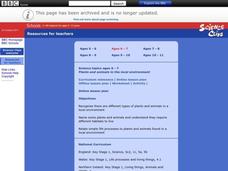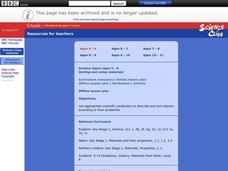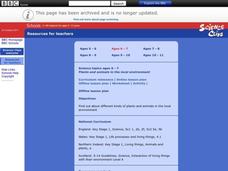Rhythm Rhyme Results
Whatʼs the Same and Whatʼs Different?
Learn about radiation, convection, and conduction with a multiple choice worksheet. Each question prompts kids to decide what is different about each form of heat energy transfer, and what is the same.
Curated OER
Keeping Warm
Young scholars participate in an online activity to determine how objects heat and cool. They determine what objects best serve as thermal insulators.
Curated OER
Habitats
Learners participate in an online lesson to determine that different plants and animals are found in different habitats. They use food chains to show feeding relationships in a habitat, and see that nearly all food chains start with a...
Curated OER
Plants and Animals in the Local Environment
Students recognize the different types of plants and animals living in a local environment. They determine how they require different habitats to live, and relate simple life processes to plants and animals found in local environments.
Curated OER
Using Electricity
Students name appliances that use electricity. They construct a simple electrical circuit. They predict whether a circuit work. They name components of an electrical circuit.
Curated OER
Keeping Healthy
Students exercise their muscles to explore concept of heart rate and to explain how blood supplies muscles with oxygen.
Curated OER
Magnets and Springs
Students participate in an online lesson making and recording observations of magnets. They determine that magnets attract some metals but not others and that other materials are not attracted to magnets.
Curated OER
Light and Shadows
Students participate in an online lesson to determine how light travels from a source, and to explain that shadows form when light travelling from a source is blocked.
Curated OER
Interdependence and Adaptation
Students construct a food web to identify producer, consumer, herbivore, carnivore and predator. They complete an online activity collecting plants and animals and arranging them in the web. They describe the interdependence between...
Curated OER
Friction
Students are introduced to the concept of friction. Using that information, they discover ways in which friction can be useful. They participate in different activities to see fricition in action. They complete a grid worksheet and...
Curated OER
Sound and Hearing
Students form an understanding that there are many different types of sound. The core concepts are presented in the most basic form for elementary school. Also students investigate how sound travels.
Curated OER
Sorting and Using Materials
Students practice sorting and classifying objects. In groups, they choose a variety of materials and describe how each one looks and feels. They must agree on how to classify each object and share their groupings with the class. They...
Curated OER
Light and Shadows
Students observe and record the apperacne of shadows and how their position and shpae changes during the course of the day. Students measure and record the length oof a partner's shadow at different intervals during the day. In pairs,...
Curated OER
Interdependence and adaptation
Students use keys to identify animals and plants in local habitats. Students are asked if they remember what the word habitat means. Students make a list of three different local habitats and brainstorm animals and plants they might...
Curated OER
Changing circuits
Students identify that there are conventional symbols to represent the components in circuits. Students use these symbols to draw diagrams of circuits. They are reminded that electric circuits can be drawn in diagrams using symbols. ...
Curated OER
Teeth And Eating
Students are introduced to several concepts about milk teeth and permanent teeth. They view photos of baby teeth, complete a worksheet that depicts their current tooth development and identify ways in which to care for permanent teeth.
Curated OER
Solids And Liquids
Students discuss the properties of solids and liquids. They complete a worksheet to show the boiling and melting points of several substances and consider if these factors affect how humans use materials.
Curated OER
Properties of Rocks
Students compare the properties of rocks. They identify objects made of rocky materials such as walls, sidewalks, etc. Students describe and group rocks based on their characteristics.
Curated OER
Forces in Action
Young scholars investigate different forces and draw arrows to signify specific directions of force. Students are then shown a brick and they are asked to draw a diagram which will include labels for the forces that are acting on the...
Curated OER
Life cycles
Students identify and explain the parts of a flower and their role in the life cycle of flowering plants, including pollination, seed dispersal and germination using the Internet. Students will also study and discuss the key points and...
Curated OER
Plants And Animals in the Local Environment
Students observe the various living things they can find outside their playground making sure to look both on the ground and in the air. They develop a large poster Venn digram, as a class, of plants and animals that live in the air, on...
Curated OER
Reversible and irreversible changes
Students define the words "reversible" and "irreversible." They complete a worksheet that shows a number of changes. Students must decide which are reversible and which are irreversible.
Curated OER
Changing Circuits
Students observe an on-line activity to review the basics of electrical circuitry, then research answers to related questions on-line.In this lesson on changing components in a series circuit, students discover how different components...

























